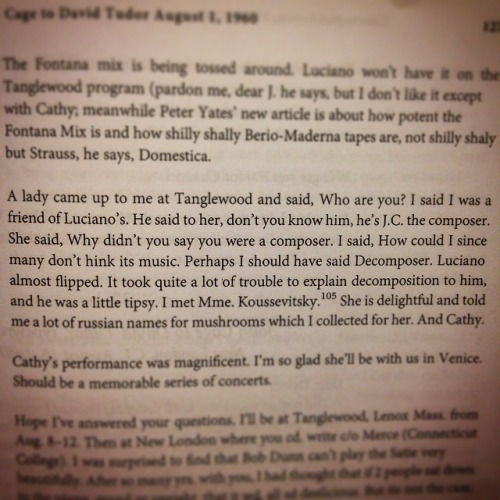Adam Tendler's Blog, page 32
January 20, 2015
yale. the john kirkpatrick papers. breathtaking, being so close...
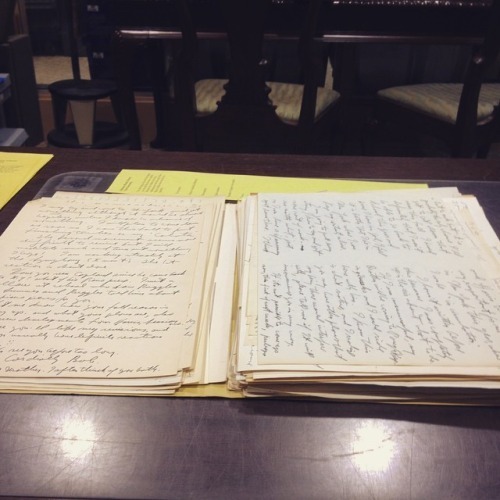
yale. the john kirkpatrick papers. breathtaking, being so close to this history.
January 16, 2015
January 9, 2015
a word from today's piano tuner
"…I’m sure the manager of [piano store] can work out a deal with you. He’s a reasonable guy. Just come down and say, ‘Hey, I’m a professional pianist.’ You know, LIE…”
January 7, 2015
jobs i've had outside of music
ice cream scooper
restaurant waiter (also bartender)
granite tool factory worker
public school substitute
sports bar cocktail waiter
construction worker
tool/parts delivery driver
coat-check clerk at jazz club
data entry (unpaid, Red Cross after hurricane katrina)
veterinary assistant
bathroom attendant /line coordinator
charter school substitute
bouncer
private school substitute
private tutor
barback
pimp (really: http://bit.ly/tendlerpimp)
January 4, 2015
it’s here, and no, it ain’t kidding. (john cage,...
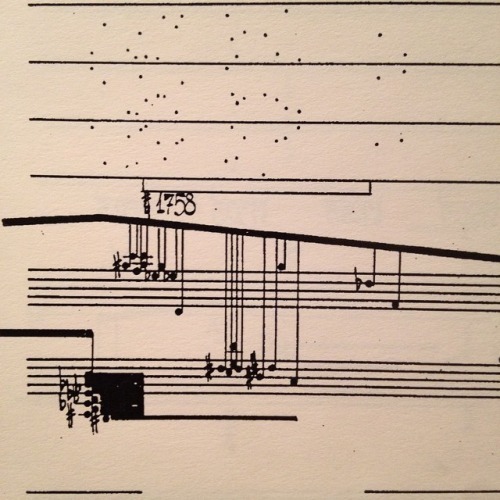
it’s here, and no, it ain’t kidding. (john cage, 34’46.776” for a pianist)
December 27, 2014
loading the woodstove
i’m remembering the winter night, over ten years ago, when he visited for the first time in years, emerging from the trees in the dark early evening on a snowmobile, pulling it in front of my parents’ house and i thought, ‘my hero,’ and i thought, ‘who travels by snowmobile?’ and i thought, ‘how did he do it?’ and i thought, ‘god, i spent years trying to lose this asshole,’ and i thought ‘he still looks great,’ and i thought ‘he still smells like how he smells, and smiles like how he smiles, and talks like how he talks.’
so much came flooding back, but the night was calm and understated, built around nothing more than simple reconnecting, talking about what had happened in the years since high school when we’d gone our separate ways—very separate ways indeed—while, i don’t know, eating pizza and watching television. when my family went to sleep and we remained in the basement, tv on, woodstove roaring, he shrugged when i asked and so it was decided that he would stay the night. i kept loading wood into the furnace, and maybe we were drinking. i don’t remember how it started, but it ended with sobs and convulsions, penetration and the release of so many years’ worth of anger and love and pain and lies and whatever emotion we feel when we miss someone and can’t tell them.
that emotion.
and then silence. and then separate ways again.
i think of that night whenever i’m home and it’s winter and i’m loading the woodstove.
December 5, 2014
favorite teacher
I’ll never forget the time my fourth grade teacher told a fellow 11 year old student in my class, “If you hit me, I’ll hit you back.”
November 19, 2014
in defense of the cluster
So dumb.
But besides silence, I would argue that we still have another aural line in the sand, one introduced most sensationally with Henry Cowell back in the early twentieth century. The cluster. I should clarify; I’m talking about the chromatic tone cluster, with black and white notes all smushed together at the same time.
Here’s the first time I encountered a cluster. It was in a Bastien book called Dinosaur Kingdom. This was from “Brontosaurus.” My reaction remains in red ink.
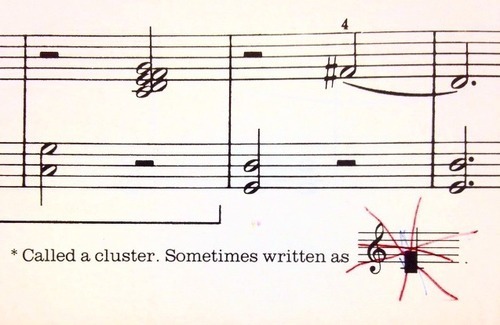
Clusters are hardly at the zenith of their novelty in the realm of modern music making. Yes, sure, but I think that they, and silence, still both get under people’s skin for the same reason.
A story: The other day, a student walked in on me practicing Berio’s music. The clusters stood out as something totally new to his eyes and ears; he’d never seen anyone intentionally play the piano this way. When I showed him the notation and technique for playing the clusters, he innocently and not-at-all disparagingly observed, “That’s something a baby could do.” Defensively, I demanded an explanation, and the ten year old replied that all he meant was that a cluster is in essence the most basic action of piano playing, perhaps the first action of piano playing. Indeed, a toddler would much rather place a palm into the keyboard than isolate a finger and press a single key, as most teachers would prefer. My student had a point; babies and cats and items we drop onto the keyboard all produce clusters. Inelegant clusters, but clusters all the same.
It’s a chord with only a flash of an identity, defined by borders: top note, bottom note, and everything in between. Clusters can sound like the sludgy color that results when kids try to paint, or at lightning speed they can come across as pure, toneless energy, like Scriabin’s trills. The latter, I’d argue, is more Berio’s intention. He wanted to liberate the cluster. Sophisticate it. Maybe disguise it.
Listen to the second movement of his Sinfonia (also known as “O King”). The clusters toward the end sound only like little bites of sound. Far from child’s play, they seem to transcend the piano itself.
Another story: So my husband has learned to cope with a lot regarding my practicing. He has heard everything from pointillism to minimalism, but the only time this patient Italian shouts “basta!" is when he hears me playing the cluster passages of the Berio Sequenza IV.
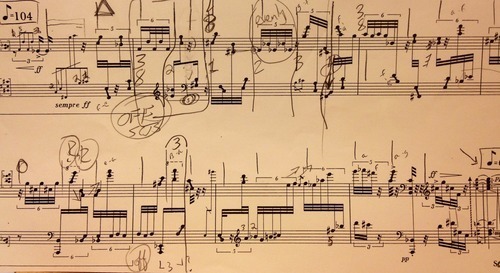
Why? Well, perhaps because as precisely as Berio chooses to notate his clusters, and as clean and un-clustery as they might (or should theoretically) sound, when you put a ton of them all over the place in a polyrhythmic clusterfuck (sorry, I couldn’t resist), the result is a provocative harkening back to what my student alluded to, a whiff of the primitive, a postcard from all of our collective pianistic infancy when all we knew was how to splash our hands across the piano. It’s psychologically (and physically) humbling for a performer to dive into clusters—these things that should be easy to play (“a baby could do it…”) but aren’t—and for the listener who doesn’t see the meticulous score or understand the difficulty in producing a well-executed cluster…well, it can all sound a little insane. And shocking. And offensive. (Or funny.) Even in 2014.
Even amongst performers and composers, the cluster can look like a non-choice, even a cop-out—”just a cluster”—not a complicated chord whose voicing a composer labored over, not some intricately-fingered gnarliness that a pianist had to practice for months to get into their fingers. The cluster remains contentious, daring us to dismiss it.
It’s the anarchy chord. The all-of-the-above chord. And it still has power to disrupt and disturb. Like Cage’s silences, the cluster strings a tightrope through the subconscious realm of “anyone could do it” and in doing so, bravely (I think) splinters the foundational artifice that classical music is the work of the gifted few, of the blessed geniuses. Instead of nothing, it invites everything to the table. All the grown-ups stir accordingly, invisibly, and force a smile.
November 17, 2014
today’s episode of meet your new piano teacher
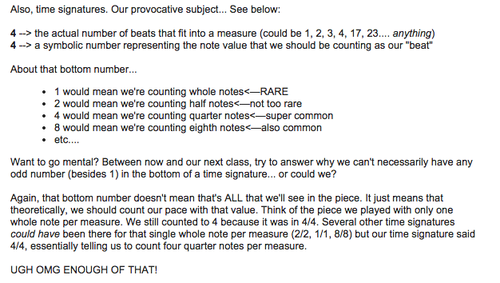
today’s episode of meet your new piano teacher
November 14, 2014
copland's birthday
It’s Copland’s birthday. He would have been 114 years old.
This is the first piece I ever heard and ever learned by the composer who changed my life.

